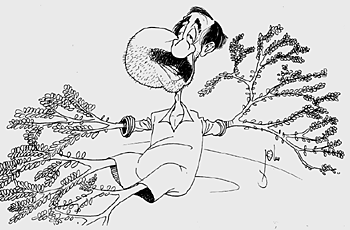
Economic impact is huge Will Qat be replaced? [Archives:2002/17/Business & Economy]
April 22 2002
BY MAHYOOB AL-KAMALI
YEMEN TIMES STAFF
Qat. It stirs all kinds of feelings for many Yemeni. Most Yemeni, in fact, would go out of their way to advocate the use of Qat, citing its benefits and social value.
More than 85 percent of the adults in Yemen use it, and an increasing number of young Yemenis are also chewing.
Its part of the daily routine and some affluent Yemenis buy enough to chew daily.
But it does have social, economic and health hazards. And a two-day Qat conference held here earlier this month had participants look at how to deal with such problems.
It was confirmed that there is an increasing number of Qat farmers due to the following reasons:
– The absence of a true agricultural policy to put an end to Qat cultivation in the most fertile lands.
– No alternative with other agricultural products such as, cereals, fruits, and vegetables.
– Short-term profit for the national economy. This has in turn resulted in the loss of self-sufficiency and has led to importing more foreign products.
One issue is that insecticides used in the cultivation of Qat imposes is a health threat.
To avoid the effect of the traditional insecticides, more attention has been given to find other alternative insecticides that have been proven harmless.
But Qat and its high revenues make it more preferable than the other kinds of crops, and farmers use chemical substances, harmful or not, to get more production, especially in winter when the tree is likely to be slowly growing.
Who is responsible?

First, the state has not promoted the production of other crops such as, coffee, cotton and vegetables.
Second, Qat sessions have been greatly encouraged by the state, which has made special grand rooms (Diwans or Mafraj) fully equipped for Qat chewing.
Third, important day-to-day state issues are commonly discussed during Qat sessions.
At last, Diwans or Mafraj have become public places where social figures meet to discuss political, social and economic issues while chewing.
To curb such a phenomenon and to put an end to this evil plant, more needs to be done than holding one or two conferences, a researcher commented.
He added further that more than 3 million people depend on profits from the sale of Qat, and thousands of people collect Qat taxes. If the government decided to pull Qat out of the economy, an economic and social catastrophe will erupt, he said.
Farmers who own even small pieces of land prefer to grow Qat in order to earn rapid revenues.
Ahmed Khaled Asharabi, a Qat farmer, said that the government has to find an alternative to guarantee the survival of his 12 family members.
——
[archive-e:17-v:2002-y:2002-d:2002-04-22-p:./2002/iss17/b&e.htm]


